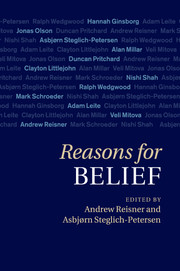Book contents
- Frontmatter
- Contents
- Contributors
- Preface
- Introduction
- PART I NORMATIVE REASONS FOR BELIEF
- PART II REASONS AND EPISTEMIC JUSTIFICATION
- 6 Reasons and belief's justification
- 7 Perception, generality, and reasons
- 8 Immediate warrant, epistemic responsibility, and Moorean dogmatism
- 9 Primitively rational belief-forming processes
- 10 What does it take to “have” a reason?
- 11 Knowledge and reasons for belief
- 12 What is the swamping problem?
- References
- Index
11 - Knowledge and reasons for belief
Published online by Cambridge University Press: 05 July 2011
- Frontmatter
- Contents
- Contributors
- Preface
- Introduction
- PART I NORMATIVE REASONS FOR BELIEF
- PART II REASONS AND EPISTEMIC JUSTIFICATION
- 6 Reasons and belief's justification
- 7 Perception, generality, and reasons
- 8 Immediate warrant, epistemic responsibility, and Moorean dogmatism
- 9 Primitively rational belief-forming processes
- 10 What does it take to “have” a reason?
- 11 Knowledge and reasons for belief
- 12 What is the swamping problem?
- References
- Index
Summary
THE PROBLEM
There are epistemological puzzles that take the form: how can we gain so much from what seems so little? Knowledge from testimony nicely illustrates this. In certain cases, which I shall call straightforward cases, we gain knowledge that something is so from a person's telling us that it is so, despite the fact that we have not, or not obviously, engaged in any reasoning bearing on the credibility of what we have been told. We accept what we have been told straight away on the say-so of the informant and thereby gain knowledge. What makes this problematic is that, given the rather special standing we take knowledge to be, it is puzzling how a person's say-so can be the means of acquiring knowledge. Arguably, part of what makes knowledge special is that it implicates justified belief. On the natural assumption that being justified in believing that p is a matter of having an adequate reason to believe that p, it can easily seem obscure that someone's telling us that p can ever be an adequate reason to believe that p.
Accepting that there is this difficulty does not commit us to accepting that knowledge admits of a reductive conceptual analysis in terms of justified belief and other conditions. If knowledge does not admit of such an analysis, as has been argued by Timothy Williamson (2000), it still might be that necessarily, one who knows that p is, in a way that is tied up with what it is to know that p, justified in believing that p.
Keywords
- Type
- Chapter
- Information
- Reasons for Belief , pp. 223 - 243Publisher: Cambridge University PressPrint publication year: 2011
- 7
- Cited by



